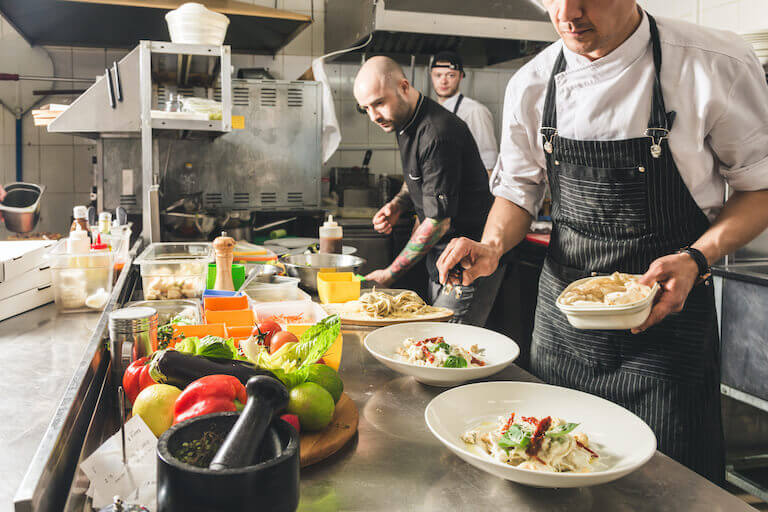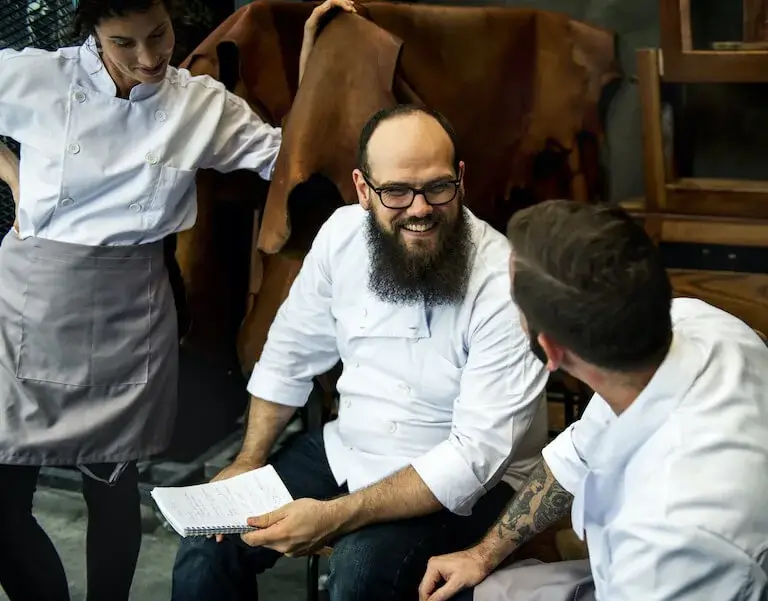Listen to This Article:
Do you find yourself drawn to the vibrant colors of a farmers market? Does the thought of crafting creative dishes from vegetables, grains, and legumes spark your imagination? If so, you might be part of a growing movement that’s reshaping the food industry.
Plant-based eating is a culinary revolution creating exciting career opportunities. Unlike strictly vegan or vegetarian diets, plant-based eating simply means that most of what’s on your plate comes from plant sources, offering flexibility that appeals to a broad range of diners. This approach has captured the attention of nearly half of all U.S. restaurants, which now offer plant-based options on their menus.
The U.S. plant-based food market reached $8.1 billion in 2024, doubling in size in less than a decade. Whether driven by health goals, environmental concerns, or simply a love for innovative flavors, this shift is creating demand for skilled culinary professionals who understand how to make vegetables the star of the plate.
Curious to find out more? Let’s take a closer look.
The Plant-Based Opportunity Landscape
The plant-based culinary field is experiencing unprecedented growth, creating opportunities across every segment of the food industry. Restaurant menu offerings featuring meatless dishes increased by 62% from 2012 to 2022, signaling a fundamental shift in how Americans dine.
This expansion goes far beyond traditional vegetarian restaurants. Mainstream establishments, from fast-casual chains to Michelin-starred fine dining venues, are embracing plant-forward menus. Even the renowned Eleven Madison Park in New York City became the first restaurant to earn three Michelin stars with an entirely plant-based tasting menu in 2022, proving that vegetables can command the same respect as any premium ingredient.
Who’s hiring plant-based culinary professionals? The opportunities span diverse sectors:
- Traditional restaurants seeking to expand their plant-based offerings
- Dedicated vegan and vegetarian establishments
- Corporate food companies developing meat and dairy alternatives
- Catering companies specializing in health-conscious events
- Food media companies creating plant-based content
- Wellness centers and health-focused hospitality venues
- Meal kit services and food delivery platforms
The timing couldn’t be better for entering this field. Younger generations are leading the charge toward more sustainable eating habits, while older consumers increasingly recognize the health benefits of plant-forward diets. This expanding demographic creates a robust customer base that goes well beyond committed vegans and vegetarians.
Key Success Factor: Understanding Your Market
Plant-based culinary professionals can succeed by recognizing they’re not just serving vegans—they’re catering to:
- Health-conscious omnivores seeking lighter options
- Environmentally-minded diners reducing meat consumption
- People with dietary restrictions (lactose intolerance, cholesterol concerns)
- Adventurous eaters exploring new flavors
This broader market means more opportunities and higher earning potential across all career paths.
Career Paths You Can Pursue with Plant-Based Expertise
Plant-Based Chef or Restaurant Chef
As a plant-based chef, you can craft menus that celebrate vegetables, grains, legumes, and innovative meat alternatives. This role demands creativity and technical skill as you develop dishes that deliver bold flavors and satisfying textures without relying on animal products.
The job outlook for chefs overall is strong, with the U.S. Bureau of Labor Statistics projecting employment growth of about 7% from 2024 to 2034—faster than average for all occupations. The 2024 median annual wage for chefs and head cooks was around $60,990, and those specializing in the growing plant-based segment may find even more opportunities.
Nearly 30% of food service operators plan to add more plant-based meat dishes to their menus, and four times as many restaurants are expanding rather than cutting their plant-based offerings. This trend creates abundant opportunities for chefs who can make “veggie magic” happen in professional kitchens.

Plant-based chefs adapt foundational culinary techniques for use with plant-based ingredients.
Shane Witters-Hicks discovered this firsthand when he left his engineering career to pursue culinary arts at Escoffier’s Boulder campus. After completing his externship at a farm-to-table bistro, Shane launched The Soulful Spread, combining his role as a private chef with virtual cooking education. He notes that cooks with plant-based skills are in such demand that he received two restaurant job offers in a single day.
Restaurant Owner or Food Entrepreneur
The surge in consumer interest has made plant-based restaurants one of the hottest segments in food entrepreneurship. As a plant-based restaurant owner, you might create anything from an upscale farm-to-table bistro to a fast-casual bowl concept or specialty bakery.
High-profile success stories demonstrate the potential: New York City’s Dirt Candy has garnered national attention for its vegetable-focused fine dining, while countless entrepreneurs have launched successful catering companies, meal delivery services, and pop-up dining experiences.
About 48% of restaurants overall now offer plant-based options, and dedicated plant-based establishments continue opening at a rapid pace, especially in urban centers and health-conscious regions. A Datassential report found that 60% of restaurant operators believe plant-based alternatives represent a long-term trend rather than a short-lived craze.
Lolita Sereleas exemplifies this entrepreneurial spirit. After completing Escoffier’s online plant-based program, she combined her Greek heritage with modern vegan innovation to launch Trogo Kitchen & Market in Chicago. Her business offers catering, pop-up events, and farm-to-table dinners, proving that cultural traditions and plant-based cooking can create compelling dining experiences.
Personal or Private Chef
Many busy professionals want to eat more plants but lack the time or knowledge to prepare satisfying meals themselves. This can create opportunities for personal chefs who prepare and deliver plant-based meals to clients, or private chefs who work in individual households managing all culinary needs.
The personal chef industry includes an estimated 34,000 professionals nationwide, many working independently. While income varies widely based on clientele and services, industry data suggests median earnings around $69,000, with high-earning personal chefs bringing in up to $151,000 per year.
The niche demand for health-oriented cooking remains solid, especially for preparing weekly plant-based meals for health-conscious households or catering to clients with specific dietary goals. Special occasions also provide opportunities, as people hire private chefs for plant-based dinner parties, retreats, or holiday celebrations.
Bree Chumley transitioned from photography to become a plant-based personal chef after completing Escoffier’s program. She creates custom menus for clients seeking healthier or allergy-sensitive diets, hosts specialty events, and promotes zero-waste cooking while developing her own spice blend line.
Career Transition Advantage
Successful plant-based culinary professionals can come from other fields, bringing valuable transferable skills:
- Business professionals ? Strong client management for personal chef work
- Healthcare workers ? Understanding of nutrition for wellness-focused roles
- Artists/creatives ? Visual presentation skills for food media careers
- Teachers ? Natural fit for culinary instruction roles
Your diverse background isn’t a limitation—it can often be a competitive edge in this industry!
Food Truck Owner
The food truck industry represents a vibrant and growing sector valued at approximately $4.36 billion, with about 48,000 food trucks operating nationwide. Plant-based concepts are particularly well-suited to food trucks, which thrive on specialized menus and unique offerings.
Food trucks have been growing about 8% annually over the past five years, with average annual revenue reaching roughly $346,000 per truck. Because 91% of food trucks are independent operators, this arena can be accessible for chef-owners with entrepreneurial ambitions.
Plant-based food trucks can differentiate themselves in crowded markets while appealing to health-conscious consumers. From vegan BBQ trucks to plant-based ice cream vans, creative concepts are gaining devoted followings. Many cities now host vegan food truck festivals, and successful truck owners often use their mobile operations as springboards to brick-and-mortar establishments.

Food trucks can be a great opportunity for plant-based chefs to develop their recipes and connect with customers.
Food Blogger, Writer, or Content Creator
The digital age has expanded opportunities for sharing plant-based recipes, restaurant reviews, and lifestyle content. Food bloggers, writers, and content creators develop recipes and publish content that educates and inspires others about plant-based cooking.
Google search volume for vegan recipes and diets has remained robust over the past decade, and many plant-based recipe bloggers have built large followings. The commercial success of vegetarian and vegan cookbooks reflects strong demand for plant-based culinary knowledge.
Writers and authors in general earn a median wage around $72,000 annually, though top cookbook authors and influencers can potentially earn more through book deals, advertising revenue, sponsorships, and online cooking classes.
Many plant-based content creators monetize through multiple streams: blog advertising, sponsored content with health food brands, paid recipe e-books, and virtual cooking instruction.
Recipe Developer or Test Kitchen Chef
The proliferation of plant-based products has created significant demand for recipe innovation. Recipe developers work in test kitchens formulating new plant-based recipes for food companies, cookbooks, magazines, or websites, often specializing in creative substitutions that achieve traditional flavors and textures without animal products.
Companies making meat alternatives or dairy-free products frequently hire chefs to devise recipes showcasing their items. There’s also steady demand for developing recipes for vegan cookbooks and restaurant menu expansions that need expert guidance on plant-based adaptations.
From 2015 to 2019, the share of new food and beverage product launches that were vegan or plant-based grew from 21% to 58% worldwide. Each new product spurs demand for original recipes, creating abundant creative opportunities for skilled recipe developers.
Baker or Pastry Chef
Plant-based baking represents a growing specialty requiring extra creativity to achieve proper textures and flavors using alternatives to eggs, butter, and dairy. Plant-based bakers might work in dedicated vegan bakeries, develop desserts for restaurants, or start specialty food product lines.
The plant-based dairy alternatives market reached $2.1 billion in 2021 and continues growing. Dollar sales of plant-based ice cream and frozen desserts grew 31% over two years, while plant-based milk now represents about 16% of all milk sales.
Bakers generally earn a median annual wage around $36,650 (as of May 2024), though those in upscale settings or head pastry chef roles can command higher salaries. Plant-based baking offers differentiation opportunities—specialists known for outstanding plant-based French pastries or wedding cakes can tap into specialty markets with premium pricing potential.
Chef Instructor or Culinary Educator
As the plant-based movement grows, so does demand for knowledgeable instructors to teach specialized techniques. Chef instructors with plant-based expertise work at culinary schools, community colleges, or run their own workshops for aspiring professionals or home cooks.
Dedicated plant-based culinary programs have emerged worldwide. The National Restaurant Association has highlighted plant-based cooking as a key trend, increasing interest among culinary students and creating demand for qualified plant-based instructors.
Culinary instructors typically earn $65,000 (as of April 2025), with experienced instructors at prestigious institutions earning more. Having formal education at least at the level you’re teaching is often required for these roles.
Mike Carrillo’s story illustrates the potential impact of culinary education. After completing Escoffier’s online plant-based culinary program in 2024, Mike was unexpectedly offered a position as Department Chair of a college culinary program. Despite lacking an academic background, his Escoffier education prepared him remarkably well for leading and shaping curriculum.
Health Coach or Nutrition-Focused Chef
Interest in food as medicine has never been higher, creating opportunities for health coaches and wellness chefs who help clients adopt plant-based eating for better health. This path might involve one-on-one nutritional counseling, meal planning, or conducting healthy cooking demonstrations.
The global health coaching market was valued around $17 billion in 2021 and is projected to reach approximately $35 billion by 2031. The U.S. health coaching market alone is forecast to exceed $9 billion by 2028, with tens of thousands of practitioners focusing on plant-based and integrative nutrition approaches.

Health coaches can have a major impact on their clients’ well being, helping them prioritize healthy diet and lifestyle.
Many people struggle to implement dietary advice—this is where coaches who can both advise and teach practical cooking skills become invaluable. For those pursuing registered dietitian credentials, the job outlook projects 6% growth from 2024 to 2034, with median annual wages of nearly $74,000.
Maria Rodriguez, already a certified functional health coach, enrolled in Escoffier’s online plant-based program to deepen her culinary skills. She was amazed by the breadth of knowledge available: “I’m gluten-free, and I didn’t know you can find more than 20 different types of gluten-free grains. That was incredible!”
Research Chef or Product Developer
Research chefs in the plant-based foods industry work on developing and improving products like meat alternatives, dairy-free cheeses, and innovative plant-based snacks. This technical, R&D-oriented career bridges culinary art and food science, requiring experimentation with ingredients, conducting sensory tests, and scaling recipes for manufacturing.
The plant-based packaged food sector has seen explosive growth, with sales of plant-based meat substitutes growing 74% between 2018 and 2021. Though growth has moderated, the category still commands over $1.4 billion in annual sales, with companies continually expanding into new categories. Job opportunities in this area could include employers like dedicated alternative protein companies, major food corporations creating plant-based versions of legacy products, and more.
How Escoffier’s Plant-Based Programs Can Prepare You for These Roles
Auguste Escoffier School of Culinary Arts offers uniquely positioned plant-based degree and diploma programs designed to help students pursue their plant-forward career aspirations through comprehensive training and real-world experience.
Skill-Building Curriculum
Escoffier’s plant-based culinary programs can cover fundamental culinary techniques through the lens of meat-free cooking. Students can practice core skills—knife work, flavor development, various cooking methods—on vegetables, grains, legumes, and plant proteins rather than animal products.
The curriculum can include specialized topics like plant-based baking, ingredient substitutions, fermentation, and global vegetarian cuisines. Students can explore practical knowledge areas including what to use in place of eggs or dairy, plant-based nutrition principles, and accommodating food allergies or preferences.
The programs don’t abandon traditional culinary arts but adapt them thoughtfully. Students still practice classical French techniques but might apply them to creating velouté sauce with vegetable stock and cashew cream instead of beef stock and dairy butter.

Escoffier students have the opportunity to study with seasoned Chef Instructors.
Business and Entrepreneurship Training
Many plant-based culinary careers involve entrepreneurship or client-facing work, making business skills essential. Escoffier’s programs may include courses in foodservice management and entrepreneurship, and may cover topics including accounting, cost control, and sustainable sourcing concepts.
Students can practice recipe development and menu design tailored to plant-based diets, while exploring topics like menu pricing, operations, and customer service—crucial skills for launching food businesses or working as personal chefs.
Sustainability and Farm-to-Table Focus
A hallmark of Escoffier’s farm-to-table philosophy involves teaching students to respect ingredients and understand environmental impact. Plant-based programs emphasize using local and seasonal produce, minimizing waste, and understanding the ethical and ecological implications of food choices.
As Dr. Stephanie White, who helped develop Escoffier’s Plant-Based programs and served as Director of Academics, notes: “Being a smart business owner means being smart about the foods you prepare and buy. Sustainability is a big piece of it.” This training resonates across plant-based career paths, whether running an eco-friendly café or developing low-carbon-footprint food products.
Hands-On Industry Experience Through Externships
One of the strongest bridges from education to employment is Escoffier’s externship requirement. Every plant-based culinary student completes at least one hands-on industry externship, with Associate degree students completing two externships as part of their program.
The school can assist students in securing an externship site relevant to their program—for plant-based students, this might mean interning at vegan restaurants, vegetarian catering companies, bakeries specializing in alternative ingredients, or research and development kitchens.
This hands-on experience, typically six weeks or more, allows students to apply skills in professional settings while potentially making valuable industry contacts. Many students treat externships as extended job interviews—it may be possible for impressive externship performance to lead to job offers.
The Externship Advantage: Your Career Accelerator
Escoffier’s externship requirement isn’t just about gaining experience—it’s strategic career positioning:
- Network Building: Meet potential employers, mentors, and collaborators
- Skill Validation: Test your abilities in real professional environments
- Career Clarity: Discover which plant-based career path truly excites you
- Job Pipeline: Externships may convert to full-time opportunities
For some students, their externship proved to be the moment their career vision became crystal clear.
Mentorship and Career Support
Beyond formal coursework, Escoffier provides ongoing support through Career Services and a network of experienced chef instructors and alumni. Career Services can assist with job search, resume building, and interview preparation—crucial for entering competitive fields like restaurant kitchens or corporate food companies.
Chef instructors can serve as mentors, holding students to high standards while sharing insights from their own careers. They can act as “coaches and mentors, holding you to the highest and best version of yourself.” This mentorship often continues after graduation, with many alumni maintaining contact with faculty who help guide early career moves and connect them with opportunities. Many graduates also join the Escoffier Alumni Association where mentorship opportunities and other important networking opportunities are available.

Escoffier students can have access to an extended support network that can assist them long after graduation.
Graduate Success Stories: From Classroom to Career
The effectiveness of Escoffier’s plant-based programs is evident in the diverse successes of its graduates, who have achieved remarkable outcomes across various segments of the food industry.
Lolita Sereleas built her own plant-based food business, blending her Greek heritage with modern vegan innovation at Trogo Kitchen & Market in Chicago. Her journey began during the pandemic when her family took over an urban farm, leading her to enroll in Escoffier’s online plant-based program to elevate her understanding beyond home-cooked favorites.
Shane Witters-Hicks transitioned from engineering to become a plant-based private chef and educator through The Soulful Spread. After completing his externship at a Boulder farm-to-table bistro, he launched his business delivering meals and offering virtual cooking classes, crediting Escoffier’s training for expanding his creativity and supporting his entrepreneurial ambitions.
Mike Carrillo leveraged his plant-based culinary education into an executive leadership role as Department Chair of a college culinary program. His story illustrates how culinary education can prepare graduates for unexpected opportunities in education and leadership.
Bree Chumley creatively combined plant-based cooking with her photography background and sustainability advocacy to carve out a unique career as a personal chef and zero-waste advocate, while developing her own spice blend line.
These examples demonstrate that an Escoffier plant-based credential can lead to tangible career advancement across diverse paths—from food truck ownership to cookbook writing to restaurant management. The versatility of this education allows graduates to find their unique niche within the expanding plant-based industry.
Information may not reflect every student’s experience. Results and outcomes may be based on several factors, such as geographical region or previous experience.
Deciding if Culinary School is Right for You
Plant-based culinary education particularly benefits individuals who:
- Want to combine passion for healthy, sustainable eating with professional culinary skills
- Seek careers that align with personal values around health, environment, and animal welfare
- Are interested in entrepreneurship within the growing plant-based market
- Desire technical training in specialized plant-based cooking techniques
- Want to enter the food industry with a competitive advantage in an expanding niche
Common misconceptions include the belief that plant-based programs are only for committed vegans. In reality, many graduates work in traditional restaurants that offer plant-based options, or pursue careers serving the growing flexitarian market.
Consider your career goals, lifestyle preferences, and passion for plant-based innovation when evaluating whether culinary school aligns with your aspirations. The combination of specialized skills, business training, and industry connections gained through formal education can significantly accelerate career development in this dynamic field.
Your Path Forward
The plant-based culinary field offers exciting possibilities for creative professionals who want to shape the future of food while building rewarding careers. From crafting the next award-winning vegan cheese to running a bustling plant-forward bistro, from educating communities about healthy eating to developing products that make sustainable choices accessible—the opportunities are as diverse as they are promising.
If you’re wondering what you can do with plant-based culinary training, the answer is: a variety of things in the food world. And you can pursue it in a way that aligns with your values of health, sustainability, and innovation.
Ready to explore how plant-based culinary education might support your career goals? Contact us to discuss how the program can align with your aspirations and help you turn your passion into a profession.
LOOKING FOR MORE? TAKE A LOOK AT THESE ARTICLES NEXT!
- The Future of Culinary Education Is Here: This Is What It Looks Like
- 8 Ways Chefs and Home Cooks Can Reduce Food Waste
- What Is Holistic Nutrition & Wellness
This article was originally published on February 26, 2022, and has since been updated.



